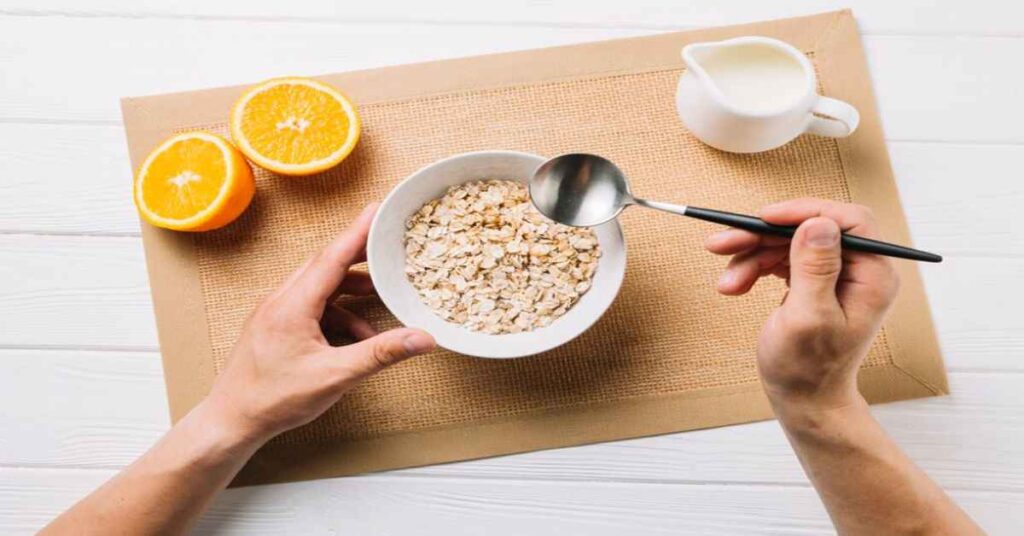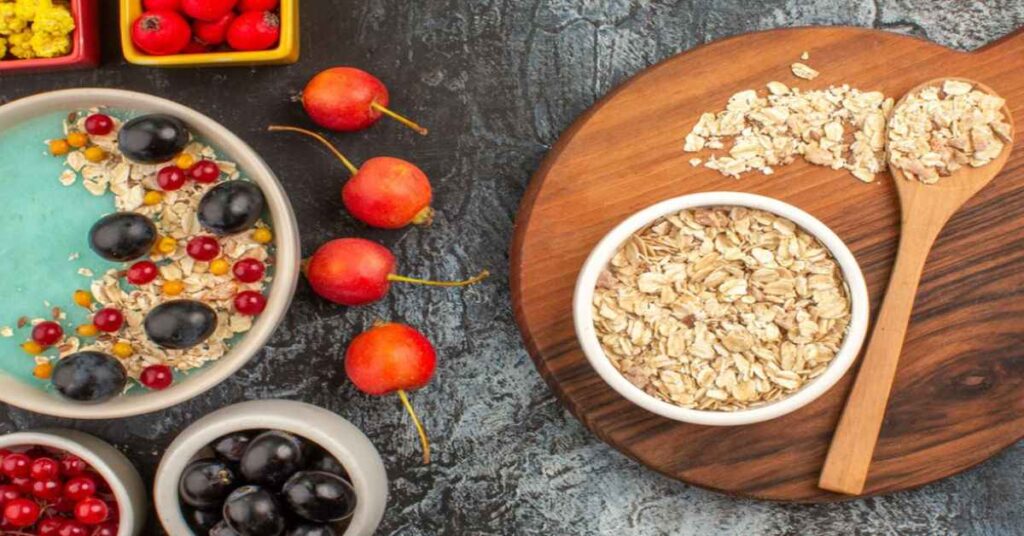Oatmeal can be a healthy choice to include in your diet, especially if it’s made with whole oats rather than processed instant oats. Here are some reasons why oatmeal is often considered a nutritious option:
Nutrient-rich:
Oatmeal is a good source of important nutrients such as fiber, protein, complex carbohydrates, and various vitamins and minerals, including iron, magnesium, phosphorus, and B vitamins.
Heart health:
Oats contain a type of soluble fiber called beta-glucan, which has been shown to help lower cholesterol levels and reduce the risk of heart disease.
Blood sugar control:
The soluble fiber in oatmeal can help stabilize blood sugar levels by slowing down the absorption of glucose into the bloodstream, which may be particularly beneficial for individuals with diabetes or those trying to manage their blood sugar levels.
Weight management:
Oatmeal is filling and can help keep you satisfied for longer periods, potentially reducing overall calorie intake and aiding in weight management.
Versatility:
Oatmeal is highly versatile and can be customized with various toppings and ingredients to suit individual tastes and nutritional needs.
However, while oatmeal can be a nutritious part of a balanced diet, it’s essential to ensure variety in your food choices and incorporate other nutrient-rich foods into your meals as well.
How much oatmeal should you eat a day?

The amount of oatmeal you should eat per day depends on various factors, including your individual nutritional needs, calorie requirements, and overall dietary preferences. However, here are some general guidelines to consider:
Serving Size:
A typical serving of cooked oatmeal is around 1/2 to 3/4 cup of dry oats, which typically yields about 1 to 1.5 cups of cooked oatmeal. This serving size provides around 150-200 calories, depending on whether water or milk is used for cooking and any additional toppings added.
Nutritional Needs:
Consider your overall nutritional needs and calorie requirements when determining how much oatmeal to eat. If you’re trying to manage your weight, a smaller serving of oatmeal may be appropriate, while if you have higher energy needs or are very active, you might opt for a larger serving.
Balanced Diet:
Remember to balance your oatmeal intake with other nutrient-rich foods throughout the day, including fruits, vegetables, lean proteins, and healthy fats. Variety is key to ensuring you get a wide range of nutrients.
Toppings and additions:
Pay attention to what you add to your oatmeal. Toppings like nuts, seeds, fruits, and a drizzle of honey or maple syrup can enhance flavor and nutrition, but be mindful of portion sizes, especially if adding ingredients that are calorie-dense.
Personal Preferences:
Lastly, listen to your body and adjust your oatmeal intake based on how it makes you feel. Some people may find that a small serving of oatmeal is sufficient to keep them satisfied, while others may prefer a larger portion.
Overall, there’s no one-size-fits-all answer to how much oatmeal you should eat per day. It’s essential to consider your individual needs, preferences, and overall dietary habits when determining the appropriate serving size for you.
Is there a downside to eating oatmeal?

While oatmeal is generally considered a healthy food choice, there are a few potential downsides to be aware of:
1.Gluten Sensitivity:
While oats themselves are naturally gluten-free, they are often processed in facilities that also handle wheat, barley, and rye, which are gluten-containing grains. Cross-contamination can occur during processing, leading to traces of gluten in some oat products. For individuals with celiac disease or non-celiac gluten sensitivity, it’s essential to choose certified gluten-free oats to avoid adverse reactions.
2. Calorie Density:
While oatmeal can be a nutritious part of a balanced diet, it’s important to be mindful of portion sizes, especially if you’re trying to manage your weight. Oatmeal can be calorie-dense, particularly when loaded with high-calorie toppings like nuts, seeds, or sweeteners. Consuming excessively large portions or adding too many calorie-dense toppings can contribute to weight gain if not accounted for within your overall calorie intake.
3. Phytic Acid Content:
Oats contain phytic acid, an anti-nutrient that can bind to minerals like iron, zinc, and calcium, reducing their absorption in the body. However, soaking oats overnight or cooking them can help reduce the phytic acid content and enhance mineral absorption.
4. Digestive Issues:
Some individuals may experience digestive discomfort or bloating after consuming oats, particularly if they have irritable bowel syndrome (IBS) or are sensitive to certain fibers. In such cases, choosing rolled or steel-cut oats over instant oats and ensuring they are well-cooked may help reduce digestive issues.
5. Blood Sugar Impact:
While oatmeal is often praised for its ability to help stabilize blood sugar levels due to its high fiber content, the impact on blood sugar can vary depending on factors such as the type of oats consumed, cooking method, and added ingredients. Some individuals may still experience fluctuations in blood sugar levels after consuming oatmeal, especially if it’s combined with sugary toppings or eaten in large portions.
while oatmeal is a nutritious food choice for many people, it’s essential to be mindful of individual dietary needs, preferences, and potential sensitivities when incorporating it into your diet.
What are the benefits of eating oatmeal every day

Eating oatmeal every day can offer several health benefits:
1. Heart Health:
Oatmeal is rich in soluble fiber, particularly beta-glucan, which has been shown to help reduce LDL cholesterol levels, often referred to as “bad” cholesterol. Lowering LDL cholesterol can help reduce the risk of heart disease and improve overall heart health.
2. Blood Sugar Control:
The soluble fiber in oatmeal can also help stabilize blood sugar levels by slowing down the absorption of glucose into the bloodstream. This can be particularly beneficial for individuals with diabetes or those at risk of developing diabetes.
3. Digestive Health:
Oatmeal is a good source of dietary fiber, which promotes healthy digestion and regular bowel movements. Fiber also helps prevent constipation and may reduce the risk of developing certain digestive disorders, such as diverticulosis.
4. Weight Management:
Oatmeal is filling and can help keep you satisfied for longer periods, which may help reduce overall calorie intake and aid in weight management. Additionally, the fiber in oatmeal helps regulate appetite and can contribute to a feeling of fullness.
5. Nutrient-Rich:
Oatmeal contains various essential nutrients, including complex carbohydrates, protein, vitamins (such as B vitamins), and minerals (such as iron, magnesium, and phosphorus). Incorporating oatmeal into your diet can help ensure you’re getting a good balance of nutrients.
6. Antioxidant Properties:
Oats contain antioxidants, such as avenanthramides, which have anti-inflammatory and anti-itching properties. These antioxidants may help protect against oxidative stress and inflammation in the body.
Versatility and Convenience:
Oatmeal is highly versatile and can be customized with various toppings and ingredients to suit individual tastes and nutritional needs. It’s also quick and easy to prepare, making it a convenient breakfast option for busy mornings.


